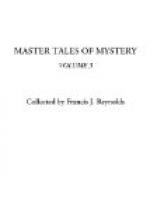“I am sure,” she cried, controlling herself with difficulty and catching at a straw, as it were, “that you gentlemen, even if you have saved my father, are no friends of either his or mine. You have merely come here in response to Dr. Burnham, and he came because Jane lost her head in the excitement and forgot that Dr. Scott is now our physician.”
“But Dr. Scott could not have been found in time, madame,” interposed Dr. Burnham with evident triumph.
She ignored the remark and continued to hold the door open.
“Now leave us,” she implored, “you, Dr. Burnham, you, Mr. Prescott, you, Professor Kennedy, and your friend Mr. Jameson, whoever you may be.”
She was now cold and calm. In the bewildering change of events we had forgotten the wan figure on the bed still gasping for the breath of life. I could not help wondering at the woman’s apparent lack of gratitude, and a thought flashed over my mind. Had the affair come to a contest between various parties fighting by fair means or foul for the old man’s money—Scott and Mrs. Martin perhaps against Prescott and Dr. Burnham.
No one moved. We seemed to be waiting on Kennedy. Prescott and Mrs. Martin were now glaring at each other implacably.
The old man moved restlessly on the bed, and over my shoulder I could hear him gasp faintly, “Where’s Grace? Send for Grace.”
Mrs. Martin paid no attention, seemed not to hear, but stood facing us imperiously as if waiting for us to obey her orders and leave the house. Burnham moved toward the door, but Prescott stood his ground with a peculiar air of defiance. Then he took my arm and started rather precipitately, I thought, to leave.
“Come, come,” said somebody behind us, “enough of the dramatics.”
It was Kennedy, who had been bending down, listening to the muttering of the old man.
“Look at those eyes of Mr. Haswell,” he said. “What color are they?”
We looked. They were blue.
“Down in the parlor,” continued Kennedy leisurely, “you will find a portrait of the long deceased Mrs. Haswell. If you will examine that painting you will see that her eyes are also a peculiarly limpid blue. No couple with blue eyes ever had a black-eyed child. At least, if this is such a case, the Carnegie Institution investigators would be glad to hear of it, for it is contrary to all that they have discovered on the subject after years of study of eugenics. Dark-eyed couples may have light-eyed children, but the reverse, never. What do you say to that, madame?”
“You lie,” screamed the woman, rushing frantically past us. “I am his daughter. No interlopers shall separate us Father!”
The old man moved feebly away from her.
“Send for Dr. Scott again,” she demanded. “See if he cannot be found. He must be found. You are all enemies, villains.”
She addressed Kennedy, but included the whole room in her denunciation.




